Luz Méndez, former director and current board member of the National Union of Guatemalan Women (UNAMG) spoke with NISGUA about the historic Sepur Zarco case that is currently being prosecuted in Guatemalan courts. UNAMG is one of the organizations that make up the Alliance to End Silence and Impunity and is one of the plaintiff organizations in the case – the first to be tried in Guatemalan courts for sexual slavery committed during the country’s internal armed conflict.
Why is this an emblematic case for Guatemala?
The Sepur Zarco case is the first one being tried in the Guatemalan justice system for sexual violence committed during the armed conflict. Despite the fact that the Historical Clarification Commission (CEH) found in its 1999 report that sexual violence was committed against women in a generalized, massive, and systematic way, these crimes remain in total impunity; there hasn’t been one conviction for these crimes. This case not only seeks justice for the women survivors of Sepur Zarco, but hopes to break this cycle of impunity around the crimes of sexual violence.
We are using strategic litigation in this case to make larger changes in the criminal justice system by using international standards around litigating sexual violence committed during armed conflicts. These standards were first created by international courts in Yugoslavia and Rwanda and continue to be embedded in the Rome Statute.
Part of these standards includes the important weight given to the testimonies of women victims; in Guatemala, more than 30 years after these crimes were committed, physical proof is difficult to show. We have heard from expert witnesses, but the most important testimonies are those of the victims. This is something new in Guatemala. There are still a lot of people who want to dismiss the case by saying that we cannot prove the crime took place because it happened so long ago. This is why we’re using strategic litigation in this case, so that changes can be made in the Guatemalan justice system to hold up women’s testimonies as the main piece and most important piece of evidence in cases of sexual violence.
Furthermore, these testimonies should not have to be repeated. It is sufficient that the women testify only once and that be considered valid for the whole trial. Anything else leads to the re-victimization of the women. These are the types of changes that we want to see in the Guatemalan justice system…Last week, when we started to show the video testimonies given by the women as part of pre-trial evidentiary hearings in 2012, the defense lawyers objected to the video testimonies and said that the women needed to testify in person again. Fortunately, the president of the tribunal, Judge Jazmín Barrios, overruled this objection and re-stated that the videos were valid and could be used.
We want these standards to be common practice in the Guatemalan justice system.
The idea behind using strategic litigation in this case is to change society’s perceptions that violence against women – including sexual violence – is permissible. Currently, sexual violence isn’t considered as a serious human rights violation, but instead, a smaller problem that has always existed and will never end. Through a criminal trial with a successful verdict, supported by a broader communications campaign, we hope to send a strong message that ends this normalization of sexual violence against women.
This case is also emblematic because the victims are Q’eqchi women. They are part of a group that faces additional oppression and discrimination in Guatemalan society for being indigenous women. If they are able to get a verdict in their favor, one that also focuses on reparations, it would help make visible that the women are protagonists, and not inferior beings as seen by broad sectors of Guatemalan society, valued insofar as they can carry out domestic work.
What are the main features of strategic litigation in this case?
This case firmly places the women at the center of the process. While the Alliance to End Silence and Impunity is providing support, we see the women survivors as the driving force behind this legal case. We are talking about atrocious crimes that were committed by perpetrators who continue to hold a lot of political and economic power in Guatemala. Building alliances is the only way that we can strengthen this driving force and help provide the support necessary to take on such strong powers.
This legal process didn’t just come into being one or two years ago, nor is the end goal of the Sepur Zarco case merely a legal one. Rather, it is a process built around organizing and becoming aware of the oppression women face. This comprehensive process started in 2003 when women survivor groups began to form, who knew first-hand the conditions needed before women could talk openly about sexual violence. You can’t just take women out of their community and bring them to testify. We have helped provide space where women’s groups from Sepur Zarco and other survivors of sexual violence from other parts of Guatemala could come together and receive psycho-social accompaniment and participate in healing processes that bring in elements of the Mayan cosmovision. They are participating in collective reflection sessions that are allowing them to change their perspectives on sexual violence and instead, see it as not only an individual act that for some reason, happened to someone. Instead, they are seeing it as a larger social problem that has structural causes that are based on a patriarchal system of domination, expressed through extreme racism towards indigenous women and through the capitalist exploitation of land grabbing.
These processes of collective reflection allow the women to overcome the feelings of guilt and embarrassment that are a common result after experiencing sexual violence during war; through collective healing processes, the women can take the guilt off their own shoulders and instead, redirect it towards the perpetrators. Only then can they become plaintiffs in a criminal case that seeks justice.
What are the international implications of this case?
Sexual violence has been part of every past and present armed conflict. Take for example the Democratic Republic of the Congo, where sexual violence has been used as a massive violation of the human rights of women; same in Syria and Afghanistan and in all of the other current wars. Few legal cases for sexual violence have been carried out in the country of origin, but I want to clarify something as some people are saying that this case is the first of its kind. That’s not completely correct.
I co-authored the report “Clamor for Justice.” For awhile, we thought that the Sepur Zarco case was the first legal case in the world where sexual violence was being prosecuted as a crime against humanity in the country where the crimes took place. But that’s not true. There are a few other cases – for example, in the Democratic Republic of the Congo and in Bosnia and Herzegovina of war crimes being prosecuted by that country. But still, there are very few examples of processes at the international level for prosecuting sexual violence committed during wartime and preventing further violence.
At the level of Latin America, this is the first case where sexual violence committed during armed conflict and under military dictatorships is being prosecuted. We are contributing on a global level to the investigation and prosecution of perpetrators of sexual violence during wartime, complementing the work already done at the International Criminal Court. It is one way we can support the prevention of sexual violence during war.
How is this case different than other cases of transitional justice?
This case is completely different than other cases of transitional justice that have advanced in the criminal justice system, because the main focus of this case is sexual violence. In other cases – for example, in the trial against Efraín Ríos Montt – the crime being tried was genocide. The testimonies of women victims who survived sexual violence were used insofar as they helped prove that sexual violence was a tool to carry out genocide. Other legal cases have made references to sexual violence, but largely it has been something that has been made invisible. In this case, however, the main focus is sexual violence. The crime of forced disappearance and torture is also being prosecuted as crimes committed against the women’s husbands as part of this case, but what sets this case apart from other cases of transitional justice is that sexual violence and sexual and domestic slavery is the main focus.
What is the importance of this case, with regards to the recognition of gender-based crimes committed today?
In the first place, the structural causes of sexual violence committed in the past remain intact. Violence against women – and particularly sexual violence – continues to be used as a tool to maintain a system of oppression by men over women.
In January 2007, a group of Q’eqchi women from the community of Lote 8 in Izabal experienced massive and repeated sexual violence. They were raped within the context of a violent eviction carried out by private security guards working for the Compañia Guatemalteca de Níquel (CGN) – subsidiary at the time to Canadian mining company HudBay Minerals – together with members of the National Civil Police and the army. The modus operandi in this case was almost identical to that which was used during the internal armed conflict: the perpetrators arrived, burned houses, destroyed the crops, and raped the women. This case reveals that in addition to the patriarchal system of domination that continues to play out today, there are other concrete elements of a counter-insurgent policy that remain intact within the National Civil Police. The post-war transition process of changing the policies in the institutions responsible for security in our country has not been carried out in accordance with the Peace Accords. The Sepur Zarco case hopes to make visible these ongoing problems, while promoting the necessary transformation in the current security and justice systems in our country.
What are the steps that have already been taken in Guatemala to end violence against women?
Without a doubt, we have made advances in a justice system that is penetrated by organized crime. Three laws have been passed that specifically address violence against women, including one on femicide; new courts specializing in femicide were created as a result. During another study we did on the eradication of violence against women and the role of the national civil police, we showed that these courts have, in fact, made advances. It hasn’t been everything we wanted, but some perpetrators have been convicted.
These laws have helped create better conditions for women to access justice. We have also seen advances in the role taken on by the Public Prosecutor’s office under the former leadership of Claudia Paz y Paz and current leadership of Thelma Aldana, while other judges have stood up in favor of an independent judicial system in light of powerful actors and specific interest groups. There are also important advances being made with regards to the awareness women have of their rights, allowing more women to denounce sexual violence and demand justice. These are important advances, supported by women’s and feminist organizations.
As an Alliance, what kind of support are you looking for from the international community?
The international community plays a crucial role. This case is being tried in an extremely difficult political climate in Guatemala, and we want this case to get the most reach possible on an international stage. Our previous government was a military government; despite the change in government, the same military powers exist within the judicial system. The women victims live within a high-risk local context that is generating a lot of fear. The perpetrators live in the same communities. Despite the fact that the women survivors covered their heads while testifying, they couldn’t hide their names. Both the women and the organizations that accompany them run a lot of risks and they have received many threats and intimidations; as a measure of security for us, it is important that this case reach a wide international audience. We are calling for people and organizations to stand in solidarity with the victims and the plaintiff organizations.
NISGUA, through the ACOGUATE project, has provided international human rights accompaniment to Sepur Zarco plaintiffs Mujeres Transformando el Mundo (Women Transforming the World) since 2011, with expanded courtroom observation provided throughout the trial. We call upon our base and international supporters to remain attentive to this case during the trial and post-verdict.

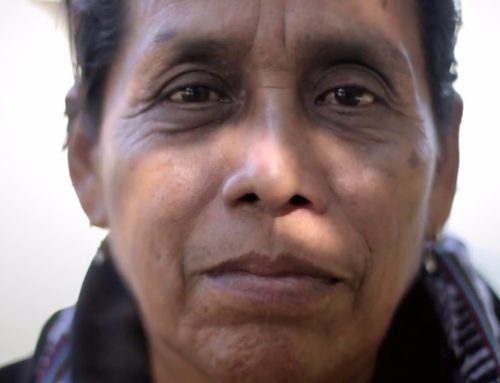
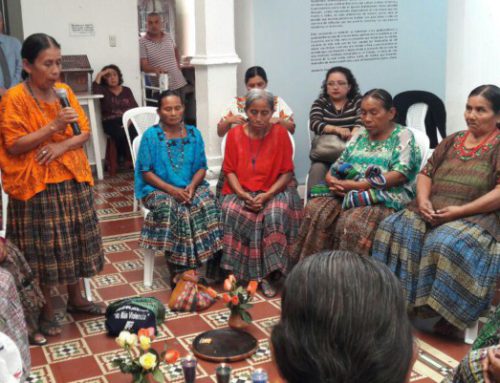
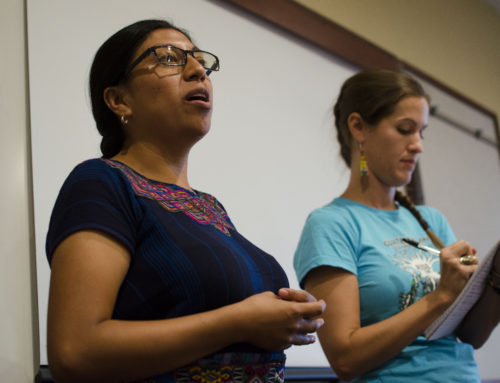
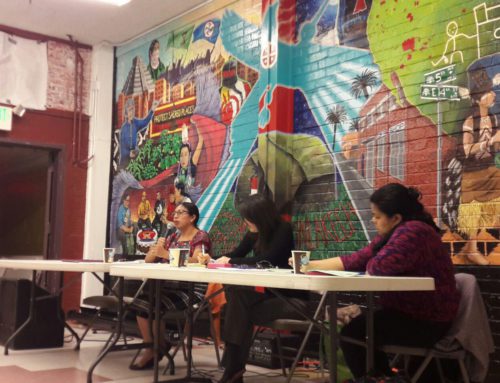
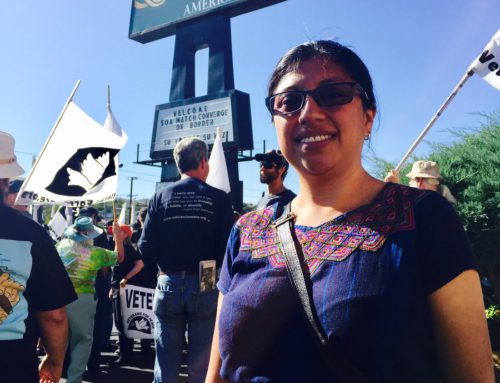
Leave A Comment